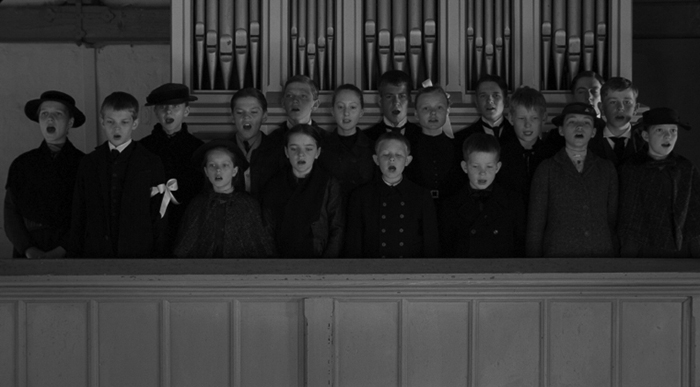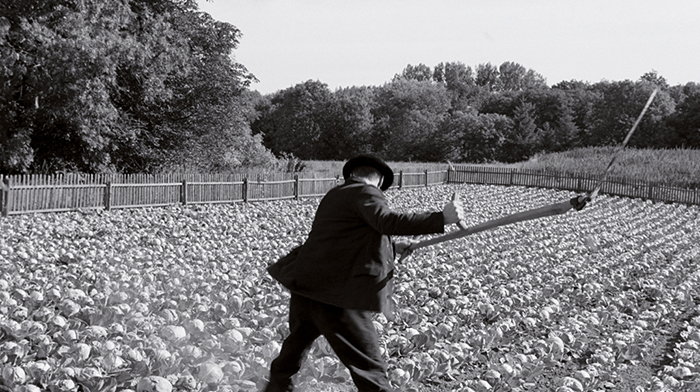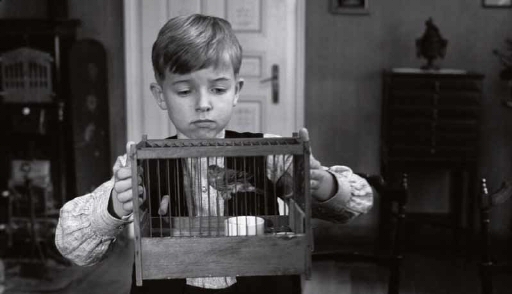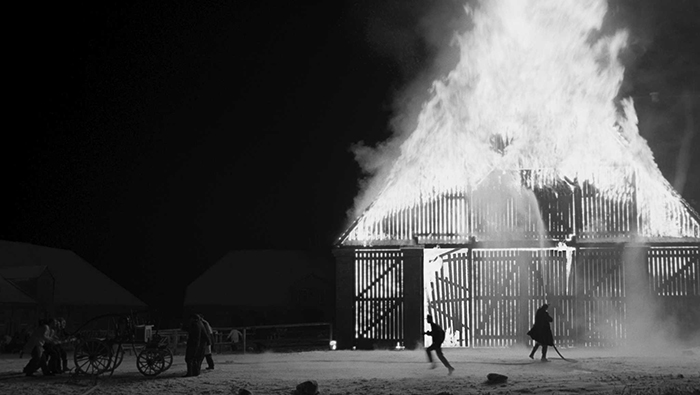
THE WHOLE HISTORY OF MY LIFE

THE WHITE RIBBON
page 2
christopher funderburg
This pertains to The White Ribbon in that nearly every critic saw that film as Haneke's "solution" to the problem of the rise of Nazism in the Weimar-era Germany and either praised his intelligence in dissecting the roots of Fascism or took issue with his glibness on the subject. On top of that, many critics found Haneke to be issuing "a warning that could easily be directed at today's Middle East or, for that matter, at us. (Mike LaSalle, SF Chronicle.)" Once again, they had him taking sides in a polemical battle. But Haneke is after something else entirely; The White Ribbon is a film that painfully, even desperately, expresses the notion that after careful consideration it makes no sense that this could have happened, that the ways in which one could imagine defeating such a rise of evil seem to have been in place already: Haneke thoughtfully and deliberately responds to the questions of Nazi ascendncy with a measured "Truly, I'm not sure. I'm not sure how this could have happened and I'm not sure what's to prevent it from happening again." It's not a dodge: it's a demolition of our prevailing ideas about the roots of evil and humanity's ability to control the movement of history. I imagine that such an answer to such a question is simply unacceptable to many audiences. But the older I get, the more valuable such uncertainty feels to me - it is perhaps only in that mental state that I can open my mind and begin to consider difficult questions. I'm past the point in my life where I have a plan for building a bridge before I even see the river.
 The White Ribbon concerns a rash of violence in a provincial German town: a tripwire brings down a man on horseback, nearly killing him. A mentally handicapped boy is brutalized. A woman falls to her death in a decaying barn. A cabbage patch is remorselessly trampled. It's pretty sickening stuff. The perpetrators of much of the violence are never revealed, although the film casts your suspicion upon the gaggle of blonde-haired moppets who are taking an onminous interest in the goings-on. Because of the creepy platinum-domed youngsters, the film has drawn comparisons to Village of the Damned, with the most unforgiving critics (i.e. stupidest) dismissing Haneke for having turned the rise of Nazism into a cheap horror film. The weakest (and probably most prevalent) criticism of the film derives from the fact that its mysteries are ultimately unresolved: Haneke is just implying that Nazism is creepy, unstoppable evil most similar to something out of a horror film - and isn't it just a little bit facile to say that the Nazis were inhuman demons a la Frederick J. Kreuger? This criticism misses the point, but I think it's fair enough in a roundabout way: Haneke isn't actually trying to describe the roots of Nazism at all. The reason these fair-haired crumb-crushers grow up to be willing servants of a demonic empire actually isn't Haneke's concern and to say that they are as mysteriously evil as a the kids in Village of the Damned is probably accurate. Because Haneke isn't addressing how an entire generation came to embrace evil, but why WWI-era German society, in many ways the apex of Western Civilization, was unable to stop them. It's not a film about the origins of unimaginable evil, but the systemic failures that allowed it to grow unabated.
The White Ribbon concerns a rash of violence in a provincial German town: a tripwire brings down a man on horseback, nearly killing him. A mentally handicapped boy is brutalized. A woman falls to her death in a decaying barn. A cabbage patch is remorselessly trampled. It's pretty sickening stuff. The perpetrators of much of the violence are never revealed, although the film casts your suspicion upon the gaggle of blonde-haired moppets who are taking an onminous interest in the goings-on. Because of the creepy platinum-domed youngsters, the film has drawn comparisons to Village of the Damned, with the most unforgiving critics (i.e. stupidest) dismissing Haneke for having turned the rise of Nazism into a cheap horror film. The weakest (and probably most prevalent) criticism of the film derives from the fact that its mysteries are ultimately unresolved: Haneke is just implying that Nazism is creepy, unstoppable evil most similar to something out of a horror film - and isn't it just a little bit facile to say that the Nazis were inhuman demons a la Frederick J. Kreuger? This criticism misses the point, but I think it's fair enough in a roundabout way: Haneke isn't actually trying to describe the roots of Nazism at all. The reason these fair-haired crumb-crushers grow up to be willing servants of a demonic empire actually isn't Haneke's concern and to say that they are as mysteriously evil as a the kids in Village of the Damned is probably accurate. Because Haneke isn't addressing how an entire generation came to embrace evil, but why WWI-era German society, in many ways the apex of Western Civilization, was unable to stop them. It's not a film about the origins of unimaginable evil, but the systemic failures that allowed it to grow unabated.
Of course the answers to that question are even more mysterious than how widespread evil comes to be the law of the land. For sure, pock-marked across history are countless examples of genocide, rape, mass murder, intolerance, large-scale violence, merciless war-mongering and apocalyptic depravity. In that regard, what makes the Nazis ascenion unique is not its cultural aims or even the effectiveness of its execution of those horrible aims. The unique quality of WWI era Germany was not its capacity for brutality, but the capacity for brutality to found in a society designed to be moral, humane and civilized. The White Ribbon carefully delineates the presence and importance of education, art, science, community, hard-work and morality in a town that would shortly succumb to Nazism: the problem of the unnamed town is not a lack of civilizing influence - and if there is any warning being issued for us today, it is that a cultural dedication to these concepts will not determine a positive course of history. By all accounts, small towns all across Germany really did achieve Western Civilization's greatest aspirations: educated, literate children with a strong connection their families and neighbors, versed in bible and its moral truths, trained in music and poetry. And hypocrisy is not the culprit: Haneke portarys the main character (a school-teacher) and the local clergyman as sincere and thoughtful in their beliefs. By modern standards, the minister is very harsh to one of his sons, but there is no indication that he is not a true believer dedicated to his religion's morality. The school-teacher seems like a straight-up nice dude and doesn't even really complain when his bike gets stolen. Sure, the local doctor is a grade-A asshat who ends his affair by telling his pregnant mistress that she sickens him, but his cruelty really isn't in conflict with his world of education, art, science, community, hard-work and morality. "Be nice" is James Dalton's commandment, not the Lord's.
While the failure of Christian principles is a prominent element of the film, Haneke is careful not to let Leftist fetishes like art and education off the hook either: the children play the recorder and the harpsicord, live with an amount of refined music and poetry in their lives that is inconceivable in a small town in the modern U.S., they go to school every day with the dedicated, straight-up good guy school-teacher and can read, write, think on a level that I think everyone would be satisfied with public school-children even now functioning. Despite being in a small town, their failings are not backwardness and ignorance. And they are nothing if not connected to their community: a neighbor is expected to care for another's injured child. Everyone knows everyone else - they meets in church every Sunday and there is little apparent back-biting or hostility. It's as pure a community as is possible. The aforementioned jerk-ass doctor plays the role of science: even in a small town, they're not being treated by witch doctors with leeches. Again, this is not the story of uneducated yokels, pliable rubes helplessly whipped into a manic fervor by crafty manipulators because their mental defenses were so thin. In many ways, this small community is all you can ask for. To demand more from society than what WWI-era Germany achieved is dubious, or at least entering into the realm of fantasy. And that's the terrifying fact: everything that could have been in place to halt the intellectual and moral deformation of these kids was in place. How could this have happened? This isn't dirty Mongols razing villages across Asia or conquistadors plundering and pillaging their way across America, this is educated, civilized Western society destroying itself. You can't point to this village and say they needed more education or more art or more scientific thinking or more moral guidance: the bulwarks against barbarism and depravity were squarely in place. And they failed.
In contemplating deeply stratified society in the throes of industrial revolution, Haneke deals carefully with the class issues of WWI-era Germany. There is, of course, a strain of thinking that sees Fascists outbursts like Nazism as the result of class tension: poor people's anger being misdirected at other groups of disenfranchised folks. Migrant laborers make a cameo in The White Ribbon and their swarthy otherness undoubtedly rankles the genteel Aryans of the village. But I think that Haneke includes this scene as nod to just how obvious the "how?" of the situation is: of course small-town Germans had their anger directed at non-pure types, that's the whole story. It's really more of a "what" as in "what happened" as opposed to a "how did it happened" - that boisterious foreigners upset the German townfolk isn't a revelation. Ethnic groups not getting along is never a revelation. But is some diversity training really all that would have been required to make things right? Of course not. Shouldn't the common folk have directed their rage at the hoity-toity fancy-folk in their palatial estate? Wouldn't that have solved all their problems: populist revolution? Indeed, Haneke present a young labor, the son of the woman killed in the barn through aristocratic negligence. The young laborer gets so mad he smashes up the rich family's beloved cabbage patch. Clearly, he has revolution on the brain. Here we find Haneke pointing out the missing ingredient for societal salvation isn't some kind of populist economic revolution: Marx, after all, was German. The possibility of popular rage taking the shape of populist was just as possible in this culture as Russia or Italy or anywhere else. In fact, Germany was class warfare's intellectual birthplace. And I suppose that we also don't need to rehash the fact that Weimar-era Germany was ostensibly as democracy as well. All of the things that were supposed to mold these children into model citizens and have them lead the world into a brigther future utterly failed. The white ribbons tied to their wrists failed to ensure their duty to goodness.
 The film pulls no punches in its complex depiction of resentment, fear, moral deformity and kindness. The children are not uniformly evil, as though some toxin had seeped into the water supply and warped them. One of the most striking moments in the movie: the minister's son offering up Peepsie, the injured bird he nursed back to health, to his father as a replacement for the murdered parakeet. Just as the school-teacher seems like as good a guy as one could imagine, many of the people in the town display a real capacity for warmth and goodness. Even the outraged young laborer is driven by a dedication to something essentially positive: make sure nothing like what happened to his mother ever happens again. This is not a town mysteriously devoid of good people, not a world polluted entirely by blackness and despair. It is a town with some good people and some bad. Some well meaning but ineffectual, some genuinely good and decent, some misguided, some weirdos, some jerks, some straight-shooters, some moralists, some thinkers, some doctors, some ministers, some laborers, some musicians, some aristocracts. I think of the boy (another son of the minister) bound to his bed by white ribbons. Clearly unhappy, the schoolteacher finds him in the woods walking dangerously along the rail of a bridge. When the teacher demands to know why he's doing something so deranged, he replies "I gave God a chance to kill me. He didn't do it, so he's pleased with me. He doesn't want me to die." He's a boy you can easily becoming a Nazi. But throughout the film, you can see he is also a boy who clearly has thought deeply about morality, about his place in the world, about everything. He's damaged by his father's attempts to make him moral - the same attempts which made his other son generous and sweet. He's suffocated by his community - a place to which his family feels great connection and responsibility. He's a good student. A smart kid. A minister's son. Society has done all it can to make him a good person.
The film pulls no punches in its complex depiction of resentment, fear, moral deformity and kindness. The children are not uniformly evil, as though some toxin had seeped into the water supply and warped them. One of the most striking moments in the movie: the minister's son offering up Peepsie, the injured bird he nursed back to health, to his father as a replacement for the murdered parakeet. Just as the school-teacher seems like as good a guy as one could imagine, many of the people in the town display a real capacity for warmth and goodness. Even the outraged young laborer is driven by a dedication to something essentially positive: make sure nothing like what happened to his mother ever happens again. This is not a town mysteriously devoid of good people, not a world polluted entirely by blackness and despair. It is a town with some good people and some bad. Some well meaning but ineffectual, some genuinely good and decent, some misguided, some weirdos, some jerks, some straight-shooters, some moralists, some thinkers, some doctors, some ministers, some laborers, some musicians, some aristocracts. I think of the boy (another son of the minister) bound to his bed by white ribbons. Clearly unhappy, the schoolteacher finds him in the woods walking dangerously along the rail of a bridge. When the teacher demands to know why he's doing something so deranged, he replies "I gave God a chance to kill me. He didn't do it, so he's pleased with me. He doesn't want me to die." He's a boy you can easily becoming a Nazi. But throughout the film, you can see he is also a boy who clearly has thought deeply about morality, about his place in the world, about everything. He's damaged by his father's attempts to make him moral - the same attempts which made his other son generous and sweet. He's suffocated by his community - a place to which his family feels great connection and responsibility. He's a good student. A smart kid. A minister's son. Society has done all it can to make him a good person.
Is there a chance that it actually ruined him?
When I think about politics, I want to write about how uncertain I feel, how weak I feel in the face of history. What if all our attempts to create a better world have absolutely unpredictable outcomes? What if we can't control history? How does Marxism become Stalinism? How does provincial Germany become the Third Reich? Writing about any of this is a losing proposition. You can accuse me of complacency, of "doing nothing" while terrible things happen. You can tell me I'm in the privileged position of benefitting from the world's misery. But when it comes down to it and I look in the faces of those in my community, when I consider myself and my capacity for failure and wrong-headedness, when I say to myself "how can I make this world a better place, how can I prevent darkness and violence and depravity from drowning my world," I'm sorry I don't have a better answer. Will there be a moment in history when violence and war and resentment and unhappiness and misery are defeated? Are we making incremental movements towards these ideals or are our luxuries inevitably built on the misery of others, on slaves in fucking candy-bar factories? Back to old-world Germany for a moment. The power of Haneke's film lies in its unwillingness to let you accept its discoveries. It's a film that stirs you, not deadens you. It drives you forward past easy answers into difficult territory where, if there are no answers, it is because it is unexplored. Haneke rightfully doesn't want to forge opinions: he wants to move forward. What is the only thing that gives us any hope of moving forward? After seeing The White Ribbon, I have an answer for at least that much.

- christopher funderburg
march 31, 2011
RELATED ARTICLES
<<Previous Page 1 2 Next Page>>
home about contact us featured writings years in review film productions
All rights reserved The Pink Smoke © 2011